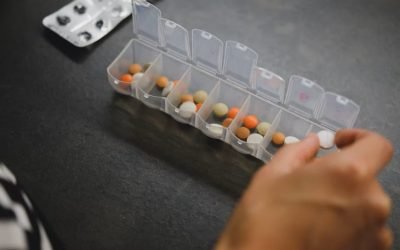Last updated: November, 2025
Mixing antidepressants with stimulant drugs such as cocaine, speed, or ecstasy can be risky in ways that are not always obvious. Both types of substances act on the brain’s chemistry, and when they overlap, their effects can become unpredictable. Understanding how they interact helps prevent harm and allows you to care for your body and mind with more awareness.
Understanding How Antidepressants Work
Antidepressants are medications that help regulate chemicals in the brain responsible for mood and emotional balance (mainly serotonin, dopamine, and norepinephrine). When these levels fall out of balance, a person may feel sadness, fatigue, or anxiety. By restoring stability to this system, antidepressants help lift mood and reduce emotional distress.
Different types of antidepressants act in slightly different ways. Some increase the amount of serotonin available, while others slow its breakdown, giving the brain more time to use it. This process takes patience and consistency, as the body adjusts gradually to the medication.
But when other substances (especially stimulants) enter the picture, this balance can shift in ways that the body isn’t prepared for.
What Are Stimulants and How Do They Affect the Brain?
Stimulants are substances that make the brain and body speed up. They create bursts of energy, confidence, or alertness, often followed by exhaustion once the effect wears off. The most common ones are cocaine, amphetamines (speed), and MDMA (ecstasy).
These drugs release large amounts of dopamine and serotonin, which briefly intensify mood and energy. The problem is that this rush also disrupts the brain’s natural rhythm. After the high fades, people often feel tired, anxious, or emotionally flat.
When stimulants are taken by someone who already uses antidepressants, the two effects can collide: both working on the same brain chemicals and pushing them beyond safe levels.
The Risks of Combining Antidepressants and Stimulants
Combining antidepressants and stimulants is especially risky because both affect the same neurotransmitters that regulate mood and energy. The most serious danger is something called serotonin syndrome, a condition caused by too much serotonin in the brain.
When Serotonin Becomes Too High
Serotonin is essential for emotional wellbeing, but an overload can make the body react in harmful ways. Early symptoms might include restlessness, sweating, or a racing heartbeat. As levels rise, the person may develop fever, confusion, or tremors. In extreme cases, the body can overheat, and heart function can become dangerously irregular.
Substances like MDMA, cocaine, and speed release large amounts of serotonin. At the same time, antidepressants — particularly SSRIs (Selective Serotonin Reuptake Inhibitors) and MAOIs (Monoamine Oxidase Inhibitors) — prevent serotonin from breaking down. The result is a buildup that the body can’t handle safely.
How the Heart and Body Are Affected
This combination also puts heavy pressure on the heart and circulatory system. Stimulants make the heart work faster and raise blood pressure, while certain antidepressants slow down how the liver clears drugs from the body. That means the stimulant stays active longer, increasing the risk of overdose.
Even small doses can lead to symptoms like overheating, chest tightness, or dizziness. These are warning signs that the body is under too much strain.
Why This Combination Can Be Life-Threatening
The danger doesn’t come from a single moment of use, but from how both drugs influence the brain in opposite directions. Antidepressants aim to steady mood; stimulants push it into overdrive. Together, they create chemical chaos that the body struggles to manage.
Some people combine them unintentionally (for example, taking prescribed medication while using a stimulant recreationally) without realising how serious the effects can be. This is especially risky with MAOI (Monoamine Oxidase Inhibitors) antidepressants, which stop the body from breaking down excess serotonin altogether.
Even if the experience feels manageable at first, the effects on the brain and heart can escalate quickly, sometimes within hours.
Safe Practices and Medical Guidance
If you take antidepressants, it’s important to be honest with your doctor about any stimulant use; even if it’s occasional. Medical professionals aren’t there to judge; they’re there to keep you safe. Sharing this information allows them to adjust medication or offer support that reduces risks.
When to Get Help
Seek medical help immediately if someone experiences symptoms such as confusion, a rapid heartbeat, high fever, or trembling after mixing substances. These could be signs of serotonin toxicity, which needs urgent treatment.
The Value of Awareness and Dialogue
Many people don’t realise that prescription medications can react with recreational drugs or even over-the-counter remedies. Learning how these combinations work is not about fear, it’s about awareness, safety, and care. Talking openly about mental health and substance use helps build understanding instead of shame.
Staying Safe
The mix of antidepressants and stimulants is more common than most people think, yet few understand how serious the risks can be. Knowing what happens inside the body when these substances interact allows for safer, more conscious decisions.
Frequently Asked Questions: Antidepressants and Stimulants
Because both act on the same brain chemicals (serotonin, dopamine, and norepinephrine) their combined effect can overwhelm the nervous system and lead to heart problems or serotonin syndrome.
Symptoms may include sweating, tremors, fever, or confusion. In severe cases, heart rhythm can become irregular or consciousness may be lost. It is a medical emergency that requires immediate care.
Yes. Even small amounts can interact with antidepressants, particularly SSRIs or MAOIs, because both affect how serotonin is processed in the body. The risk is higher than many people realise.
MAOIs are especially dangerous, as they stop serotonin from breaking down. SSRIs can also be risky, particularly with MDMA or cocaine, which already release large amounts of serotonin.
Doctors are trained to provide support, not judgment. Being open about substance use helps them protect your safety and ensure treatment works properly without harmful interactions.









